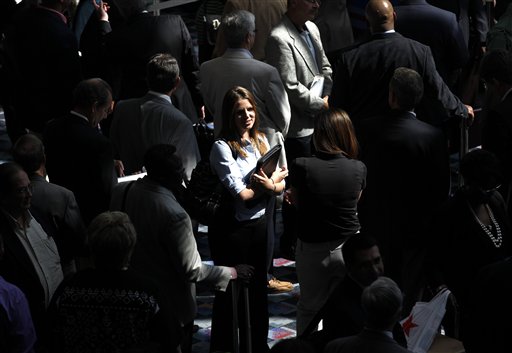(AP) Tepid economic growth weighs on US job market
By CHRISTOPHER S. RUGABER and MARTIN CRUTSINGER
AP Economics Writers
WASHINGTON
The U.S. economy is growing too slowly to pull the job market out of a slump, according to the latest data that suggest June has been another weak month for hiring.
Applications for unemployment benefits stayed above a level last week that is generally considered too high to lower the unemployment rate. And the annual growth rate for the U.S. economy in the January-March quarter was unchanged at a tepid 1.9 percent.
Two government reports released Thursday added to the picture of an economy that is faltering for the third straight year after a promising start. Job growth has tumbled, consumers are less confident and Europe’s financial crisis has dampened demand for U.S. exports.
Most economists don’t see growth accelerating much from the first-quarter pace, although some are hopeful that lower gas prices could help lift consumer spending over the summer.
Growth of around 1.9 percent typically generates roughly 90,000 jobs a month. That’s considered too weak to lower the unemployment rate, which was 8.2 percent last month.
Slow improvement in the economy threatens President Barack Obama’s re-election hopes. He is likely to face voters with the highest unemployment rate of any president since the Great Depression.
The Federal Reserve last week downgraded its outlook for 2012 growth. The Fed now predicts the economy will grow between 1.9 percent and 2.4 percent this year _ a half a percentage point lower than its forecast in April. And it doesn’t see the unemployment rate falling much lower this year.
Hiring hasn’t likely improved in June, based on the level of people applying for unemployment benefits.
Weekly applications fell only slightly last week to a seasonally adjusted 386,000, the Labor Department said. Applications have climbed nearly 5 percent in the past two months.
When applications are above 375,000, it generally means that hiring isn’t strong enough to rapidly lower the unemployment rate.
Economists are predicting that 100,000 jobs were added in June and the unemployment rate did not change, according to a survey by FactSet. The government will issue the June employment report on July 6.
Employers added an average of only 73,000 jobs a month in April and May after averaging 226,000 a month in the first three months of the year.
The report on the first quarter’s economic growth showed that U.S. corporate profits fell, the first quarterly decline since the final three months of 2008.
U.S. corporations earned less profit overseas, the report said. That’s likely a result of Europe’s economic woes and slowing growth in countries like China and India. Lower overseas profits could discourage U.S. employers from adding some jobs in the second half of the year.
Other recent indicators have painted a mixed picture of the economy.
A closely watched private survey released this week showed consumer confidence fell in June for the fourth straight month. The Conference Board said worries about the job market outweighed lower gas prices and steady improvement in the housing market.
Americans have received little in the way of pay raises this year, with wage growth trailing inflation. That has started to slow their growth in spending. Retails sales have barely grown in the past two months.
Less growth in consumer spending has also hurt U.S. manufacturing activity, a leading economic driver since the recession ended. Factories produced less in May than April, the Federal Reserve said this month. Automakers cut back on output for the first time in six months.
There have been hopeful signs.
Gas prices have plummeted since peaking in April near $4 per gallon. The average national price for a gallon of gas was $3.37 on Thursday, according to auto club AAA, Wright Express and the Oil Price Information Service.
U.S. factories received more orders for long-lasting manufactured goods in May, while a key measure of business investment plans rose.
And Americans are starting to gain more confidence in the long-suffering housing market. Home sales are up from last year and signed contracts to buy homes matched a two-year high in May.
One reason home sales are increasing is mortgage rates have fallen to the lowest levels on record. This week, the average rate on a 30-year fixed mortgage stayed at 3.66 percent. That’s unchanged from last week and the lowest since long-term mortgages began in the 1950s.
Home prices have started to rise in most cities. And homebuilders are planning to break ground on more projects in the next 12 months.

COMMENTS
Please let us know if you're having issues with commenting.